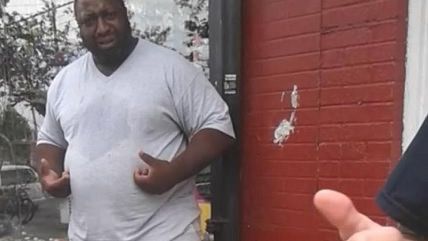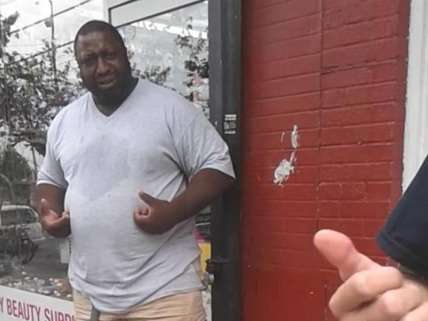Of Course Racism Was a Factor in Eric Garner's Death; Identifying It Isn't a Solution


Some on the left are aghast that libertarians, but especially that conservatives are disturbed by the grand jury decision not to indict Danny Pantaleo, the New York City cop who placed Eric Garner in a fatal chokehold. And they're upset that those libertarians and conservative are pointing to New York City's laws against selling loose, untaxed cigarettes as a contributing factor. In their narrative, Eric Garner's death is attributable exclusively to a racist cop who used excessive force. And in fact, Pantaleo has multiple complaints of racial bias against him. And he certainly used excessive force. But if Pantaleo is a racist, more training won't make him not a racist. Despite the best efforts of professional diversity and sensitivity trainers, racism and hatred are not something a five-, 10-, or even 40-hour course will rid a heart of. The idea that the right training can change a racist cop s delirious.
Is there a way to get rid of racist cops? They can be fired, but not always. Many police departments, including New York's, have generous job protections for police officers. These privileges, masquerading as "due process," protect bad cops. Defenders of public unions say it isn't fair to fire a public employee merely for the appearance of impropriety, bias, or even corruption and criminality. But is it fair to expose an untold number of people to a potential violent offender because he managed to get on the public payroll and access the privileges that come with it? Take the example of alleged sexual predator Thomas Tolstoy, returned to the Philadelphia Police Department even though the police chief doesn't want him because prosecutors couldn't make the charges stick. Union protections keep these kind of risky people on the street in uniform.
What about a more diverse police force? Even Slate has debunked this as any kind of solution to police brutality. "Just because an officer is black," wrote Jamelle Bouie, "doesn't mean he's less likely to use violence against black citizens." Some numbers from ProPublica to enforce that:
Black officers account for a little more than 10 percent of all [reported] fatal police shootings. Of those they kill, though, 78 percent were black.
White officers, given their great numbers in so many of the country's police departments, are well represented in all categories of police killings. White officers killed 91 percent of the whites who died at the hands of police. And they were responsible for 68 percent of the people of color killed. Those people of color represented 46 percent of all those killed by white officers.
Garner's death, and others like his, aren't counted even in the inadequate counts of police shootings, because it wasn't a shooting.
Another solution to racist policing is to ratchet up police targeting of white people. From an interview last year with Councilman Andy King, a Bronx Democrat who represents the district where Ramarley Graham was shot in his grandmother's house after being pursed by cops over a small amount of weed and who participated in rallies in support of Graham, an excerpt:
Reason: If the NYPD were to counteract accusations of racial profiling by targeting more young white males suspected of making illegal drug purchases, would that lend their activities in the community more credence?
King: If the scale is equal, of course. Because they're doing something wrong… for us to act like there's no drug use in the white community, we're fooling ourselves. There's coke heads on Wall Street. In communities of color we're constantly hearing about the mistakes, but you never hear about crime in the white communities, with police saying oops. So why do we have it now and always in communities of color? It's unfair to target just young men of color.
None of what King said would have prevented the death of Ramarley Graham. So would it be unfair to say that for King it's appearances that matter more than lives?
Focusing on the issue of overcriminalization as a route to alleviating police brutality is not a race-blind tactic. The laws that spark interactions like the one between police and Eric Garner disproportionately affect the poor and minorities, both in their substance (rich white people can afford a hefty cigarette tax, say, and have front yards for their grills) and in their enforcement (a white person dressed the "right" way is more likely to get away with selling loose cigarettes because they don't conform to cops' biases of what a loose cigarette dealer looks like). Nanny state laws—laws with no victims that are instead about correcting behavior—are especially burdensome on poor and marginalized communities, and come from a long history of white supremacy and the idea that poor people, especially poor black people, are too stupid to be the masters of their own lives.
At the end of the day, it's impossible to say for certain if Danny Pantaleo is a racist. Only he knows that. But it's possible to say for certain that if his supervisors hadn't ordered him and other plainclothes officers to patrol Staten Island for loose cigarette dealers then Eric Garner, a man known to the police as a loose cigarette dealer, wouldn't have been approached by cops and eventually placed in a fatal chokehold.
Reason's annual Webathon is underway! Your (tax-deductible!) gift will help Reason magazine, Reason.com, and Reason TV bring the case for "Free Minds and Free Markets" to bigger and bigger audiences. For giving levels and associated swag, go here now.


Show Comments (68)